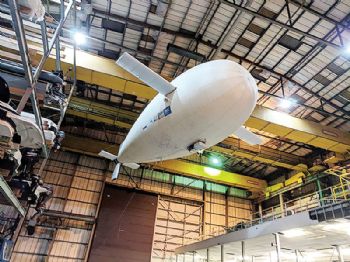
The Coventry-based Manufacturing Technology Centre (MTC) is playing a major role in a project to develop the world’s first unmanned variable-buoyancy-powered ultra-long-endurance aircraft.
The autonomously controlled Phoenix has undergone successful test flights; it could help the UK to take the lead in the development of pseudo-satellites that can fly autonomously, at very high altitudes and for long periods of time (often months).
Pseudo-satellites can fly above commercial aircraft routes, turbulence and moisture; they can be used to complement conventional satellites with earth-mapping, scientific observation and intelligence-gathering.
The 15m-long Phoenix spends half its time as a heavier-than-air aeroplane and the other half as a lighter-than-air helium balloon, with the repeated transition between these two states providing its sole source of propulsion.
Phoenix has been developed by a consortium of industrial partners, universities and members of the High Value Manufacturing Catapult.
MTC (
www.the-mtc.org) engineers made extensive use of National Instruments’ hardware and software suites to build, program and test the aircraft’s control system, including hardware-in-the-loop tests of its autonomous pilot system (developed by Bristol-based Stirling Dynamics).
The MTC has also provided testing facilities and expertise for hardware components, including pumps and actuators provided by Faversham-based TCS Micropumps.
In addition, support was provided to the flight trials, including assembly, piloting and testing.
MTC technology director Ken Young said that the Innovate UK-funded Phoenix project is at the cutting edge of aerospace technology.
“The variable-buoyancy propulsion technology has been used before for remote-controlled underwater vehicles but not for the propulsion of a large aircraft.
"The power for the flight-control surfaces, valves and pumps comes from a battery charged by an array of lightweight flexible solar cells.”